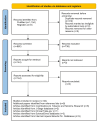The Product Science of Electrically Heated Tobacco Products: An Updated Narrative Review of the Scientific Literature
- PMID: 38939262
- PMCID: PMC11209752
- DOI: 10.7759/cureus.61223
The Product Science of Electrically Heated Tobacco Products: An Updated Narrative Review of the Scientific Literature
Abstract
Heated tobacco products represent a novel category of tobacco products in which a tobacco consumable is heated to a temperature that releases nicotine from the tobacco leaf but not to a temperature sufficient to cause combustion. Heated tobacco products may therefore have the potential to be a less harmful alternative for adult smokers who would otherwise continue to smoke cigarettes, as their use should result in exposure to substantially fewer and lower levels of toxicants. This update represents a two-year extension to our previous narrative review, which covered peer-reviewed journal articles published up to August 31, 2021. The scientific evidence published between 2021 and 2023 continues to indicate that aerosols produced from heated tobacco products contain fewer and substantially lower levels of harmful and potentially harmful constituents and that these observed reductions consistently translate to reduced biological effects in both in vitro and in vivo toxicological studies. Biomarker and clinical data from studies in which product use is controlled within a clinical setting continue to suggest changes in levels of biomarkers of exposure, biomarkers of potential harm, and clinical endpoints indicating the potential for reduced harm with switching to exclusive use of heated tobacco products in adult smokers. Overall, the available peer-reviewed scientific evidence continues to indicate that heated tobacco products offer promise as a potentially less harmful alternative to cigarettes, and as such, the conclusions of our original narrative review remain valid.
Keywords: heat-not-burn tobacco; heated tobacco products; next generation products; public health; risk reduction; smoking; tobacco harm reduction; tobacco heating products.
Copyright © 2024, Cordery et al.
Conflict of interest statement
Conflicts of interest: In compliance with the ICMJE uniform disclosure form, all authors declare the following: Payment/services info: SC, MS, LS, FC, EG, LM, and SW are employed by Imperial Brands Plc, UK. TN is employed by Reemtsma Cigarettenfabriken GmbH, an Imperial Brands Plc. company. KT is an employee of Elucid8 Holdings Ltd. and is acting as an independent scientific consultant to Imperial Brands Plc. KT is a former employee of Gallaher Ltd. and Japan Tobacco International UK Ltd. Imperial Brands and Japan Tobacco International produce the electrically heated tobacco products ‘Pulze’ and ‘Ploom’, respectively. IMF is an independent consultant to vaping/tobacco product manufacturers, including Imperial Brands Plc, to provide scientific and regulatory support. IMF is a Non-Executive Director with Advanced Inhalation Rituals Ltd, a manufacturer of waterpipe tobacco and electronic waterpipe products, and is also a retained Scientific Advisory Board member of Qnovia, LLC, an inhaled nicotine pharmaceutical smoking cessation product manufacturer. Financial relationships: Ian M. Fearon declare(s) personal fees, employment and stock/stock options from BAT. SC, EG, LM, LS, FC, MS, and SW declare employment and stock/stock options from Imperial Brands PLC. IMF declares personal fees from RAI Services Company. IMF declares personal fees from Shenzhen Smoore Technology Ltd. IMF declares personal fees from LA Clinical Trials, LLC. IMF declares personal fees, stock/stock options and Scientific Advisory Board member from Qnovia, Inc. IMF declares personal fees and stock/stock options from British American Tobacco. IMF declares personal fees from Imperial Brands PLC. TN declares employment and stock/stock options from Reemtsma Cigarettenfabriken. IMF declares personal fees from tobacco and nicotine product manufacturers and contract research organizations (CROs). IMF is an independent consultant to tobacco and nicotine product manufacturers and CROs and provides scientific support for clinical and behavioral studies and general regulatory support. These manufacturers/CROs are unspecified for confidentiality reasons. IMF declares employment with Broughton Life Sciences Ltd. IMF declares travel expenses to attend the tobacco expo from Messe Dortmund GmbH. IMF declares personal fees from E-Alternative Solutions, LLC. IMF declares personal fees from Shenzhen JWEI Electronics Co., Ltd. IMF declares personal fees from JUUL Labs and JUUL Labs UK Holdco Ltd. IMF declares personal fees from Cheerain HK Ltd. IMF declares personal fees from Advanced Inhalation Rituals Ltd. Other relationships: All authors have declared that there are no other relationships or activities that could appear to have influenced the submitted work. Other relationships: All authors have declared that there are no other relationships or activities that could appear to have influenced the submitted work.
References
-
- Centers for Disease Control and Prevention (US); National Center for Chronic Disease Prevention and Health Promotion (US); Office on Smoking and Health (US) Atlanta (GA): Centers for Disease Control and Prevention (US); [ Oct; 2023 ]. 2010. How Tobacco Smoke Causes Disease: The Biology and Behavioral Basis for Smoking-Attributable Disease. - PubMed
-
- American Cancer Society. Atlanta (GA): American Cancer Society, Inc.; 2018. The Tobacco Atlas, Sixth Edition.
-
- Health effects of tobacco at the global, regional, and national levels: results from the 2019 Global Burden of Disease Study. He H, Pan Z, Wu J, Hu C, Bai L, Lyu J. Nicotine Tob Res. 2022;24:864–870. - PubMed
Publication types
LinkOut - more resources
Full Text Sources

